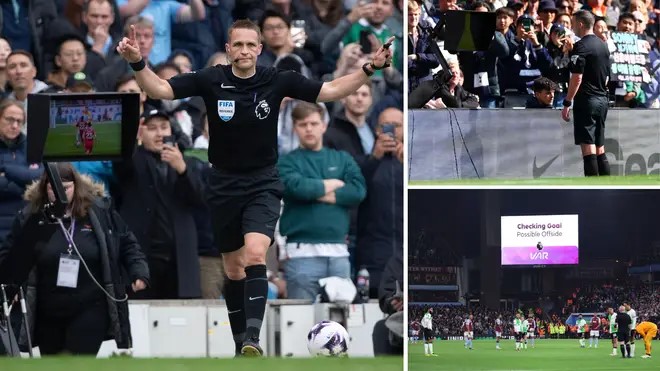The world’s most popular football league is on the verge of a seismic shift as Premier League clubs prepare to cast their votes on the future of Video Assistant Referees (VAR). This dramatic development follows a season marred by frustration and controversy surrounding the technology’s on-field impact.
Wolves: The VAR Red Card?
Wolverhampton Wanderers FC (Wolves) has emerged as the main protagonist in this potential revolution. The club formally submitted a resolution to the Premier League, triggering a vote at the upcoming annual general meeting scheduled for June 6th in Harrogate.
Wolves Lament VAR’s Unforeseen Consequences
In an official statement, Wolves acknowledge the well-meaning intentions behind VAR’s introduction. However, they argue that the technology has produced “a multitude of unintended negative consequences” that have strained the connection between fans and the very essence of the game.
A VAR-filled Season of Discontent
The 2023/24 season has been a VAR VARmageddon, riddled with contentious decisions that have sparked outrage and heated debate. Wolves themselves have been on the receiving end of several controversial calls, leading them to believe that the “marginal gains” in accuracy come at a hefty price – the erosion of the “spirit of the game” that fans cherish.
Premier League: Committed to Refining the System
The Premier League recognizes the concerns raised by clubs like Wolves. However, they remain steadfast in their support of technological officiating tools. They emphasize their “continued commitment” to VAR and their ongoing collaboration with the Professional Game Match Officials Limited (PGMOL) to refine the system and ensure its effectiveness.
A High Hurdle for VAR Removal
Eliminating VAR is no easy feat. The Premier League’s rule change process requires a two-thirds majority vote, with 14 out of the 20 member clubs needing to back the proposal.
Mixed Signals: Automation In, VAR Out?
The decision to embrace semi-automated offside technology for the upcoming season suggests that the Premier League is not entirely averse to technological advancements in officiating. This creates a curious situation: are they open to some forms of officiating tech but not others? Experts suggest that the Premier League may be taking a cautious approach, willing to integrate new technology that is demonstrably accurate and less prone to human error (like semi-automated offside detection) while remaining hesitant about VAR, a system that still relies heavily on subjective interpretation and human intervention.
Managers Sound the VAR Alarm
The discontent with VAR extends beyond Wolves. Several prominent Premier League managers, including Wolves boss Gary O’Neil, have been vocal critics of both VAR and the overall quality of refereeing this season. O’Neil even faced a one-match touchline ban for his conduct near the referee’s room following a controversial VAR decision that disallowed a late equalizer for Wolves against West Ham.
Wolves Chairman Echos Concerns
Jeff Shi, the chairman of Wolves, has also publicly questioned the role of VAR, suggesting that his club would be higher in the league table if not for a string of “incorrect or dubious decisions.”
Luis Diaz: A Case Study in VAR Blunders
One of the most glaring examples of a VAR mistake occurred in October when a legitimate goal by Liverpool’s Luis Diaz was incorrectly ruled offside against Tottenham Hotspur. The Premier League itself acknowledged this incident as a glaring example of “systemic weaknesses in the VAR process” and took “immediate corrective actions” to address the issue.
The VAR Verdict: A Midsummer Vote
The upcoming vote in June will be a watershed moment for VAR in the Premier League. Will fans see a return to the (sometimes chaotic) pre-VAR era, or will a reformed and improved video assistant system emerge? Only time will tell. One thing is certain: the beautiful game is at a crossroads, with the fate of VAR hanging in the balance.
The Road Ahead: Potential Outcomes and Lingering Questions
The Premier League’s decision on VAR will have ripple effects throughout the world of football. A return to the pre-VAR era, while potentially popular with fans who value the flow of the game, could reignite concerns about missed calls and potential refereeing bias. On the other hand, scrapping VAR entirely would represent a significant setback for the sport’s embrace of technology.
The most likely outcome appears to be a compromise: a reformed VAR system with stricter protocols, improved communication between referees and VAR officials, and a greater emphasis on accuracy over time-wasting stoppages for reviews. However, lingering questions remain about the subjectivity inherent in certain VAR decisions and the challenge of striking the right balance between technological assistance and the human element that is so integral to the game.










